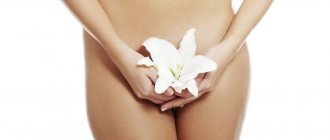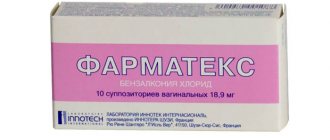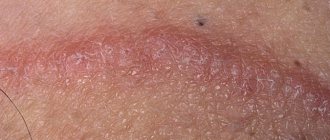Before prescribing an ointment, the doctor identifies the causative agent of the disease. Depending on this, the drug is selected.
For antibacterial ointments:
Vulvitis of bacterial origin, like any infectious disease, requires complex treatment. Before using the ointment, it is necessary to treat the genitals with antiseptics. Along with external agents, medications for oral administration are also prescribed. The patient is recommended to take vitamins, minerals, and bifidobacteria.
Healing
Another group of ointments used for vulvitis are healing ones. They are used after acute symptoms of the disease have been relieved. Healing medications can relieve inflammation and irritation and regenerate damaged tissue. Medicines in this group include:
- Vaginorm C. This medicine heals the mucous membrane of the genital organs damaged by vulvitis. Vaginorm normalizes pH levels and microflora, and has a positive effect on local immunity. The drug also has protective effects: its active substances prevent harmful microorganisms from penetrating into the woman’s reproductive system. Vaginorm is prescribed by doctors as a prophylactic for chronic vulvitis.
- Radevit. The medicine is used to relieve inflammation and itching, and heal damaged areas. The drug has protective functions.
Actovegin. This ointment is prepared based on the blood of cattle. Gynecologists prescribe the drug to patients who have problems with the acid-base balance of the vagina, which occurs with vulvitis. The medicine accelerates the process of tissue restoration and improves their nutrition at the cellular level.
Any healing ointment is used for 3-4 weeks, until the soft tissues of the external genitalia are completely restored after the disease. It is important to follow the rules of personal hygiene and doctor’s recommendations.
Patients need to understand that ointments are effective only in the initial stages of the disease. If vulvitis caused by fungi or bacteria is advanced, then along with external agents it is necessary to take antibiotics and antimycotics orally. Any treatment must be carried out under the supervision of a physician.
Bepanten and Rescuer to help
D-Panthenol ointment - this drug copes well with violations of the integrity of the skin caused by various reasons.
The product normalizes cellular metabolism, increases the strength of collagen fibers, thereby increasing the skin's ability to regenerate. In case of damage to the skin and deep tissues, the body requires additional amounts of pantothenic acid, which this drug contains. The substance penetrates into all layers of the skin. Has a slight anti-inflammatory effect. Can be replaced by Bepanten.
Rescue Balm is a complex preparation. Milk lipids have a softening, regenerating, and nourishing effect on the skin. A protective film is formed on the skin, due to which less moisture evaporates. Lipids can moisturize the epidermis and accelerate wound scarring.
Sea buckthorn oil, which is part of the balm, has an antioxidant effect and regenerates skin cells.
Beeswax is an antiseptic, softening and protective substance.
Read more Demodectic blepharitis symptoms and treatment
Turpentines relieve inflammation, relieve pain, constrict blood vessels, and stimulate.
Echinacea extract is a good antioxidant and immunostimulant.
Lavender oil soothes the skin and relieves irritation. Is a strong antiseptic.
Balm Rescuer has a complex effect on wounds and cracks. Has many effects. The clinical effect is very fast, the therapeutic effect appears within a few hours after use. Taken together, complementing each other, all components of the drug have the following effects:
- regenerating;
- soothing;
- antibacterial;
- healing;
- protective;
- moisturizing;
- painkiller.
Like all ointments, the balm is applied to a clean, dry surface. A small amount of. Then they cover it with a bandage or gauze, and seal it with a plaster on top for a better effect. The next dose can be used when changing the dressing or absorbing the balm.
Benefits of topical medications
Vulvitis is a lesion of the mucous membrane covering the labia minora, clitoris, urethral opening and vaginal opening. It can be caused by many reasons. In women of reproductive age, the disease is more often provoked by bacterial flora. In girls before menstruation and in old age, such a pathology in most cases is a consequence of excessive use of soap for washing and douching with antiseptics.
Another cause of vulvitis may be an allergic reaction that occurs in response to ingestion of a certain food or direct contact of the skin of the perineum with an irritant. This is the fabric from which underwear or bed linen, washing powder or fabric softener are sewn. Often inflammation occurs due to poor hygiene, contact with feces on the external genital area (this is especially true for girls). Ointments for the treatment of vulvitis in both women and children are divided into the following groups:
- antibacterial;
- wound healing;
- hormonal;
- fungicidal.
In the initial stages, treating vulvitis with ointment is more effective than using tablets. Before entering the external genital area with the bloodstream, the active component of the syrup or capsules must pass through the digestive tract. This takes some time, in addition, with this method of use the risk of side effects increases. It is also worth noting that many antibacterial drugs are contraindicated for little girls or women during pregnancy and lactation.
The ointment is applied directly to the inflamed areas, and it begins to “work” after a few minutes. In addition, the active substance enters the blood in a minimal concentration, so the possibility of various complications is low. But for effective treatment of vulvitis, it is necessary to use ointments according to the instructions. The drug should be applied 2-3 times a day after washing with plain water or antiseptic solutions (Citeal, potassium permanganate, chamomile decoction or oak bark).
If a fungus is to blame
There is an insidious disease - candidiasis, or thrush. It causes redness of the labia. The discharge becomes cheesy, and redness with whitish spots are visible in the vagina. Itching worsens during sleep, after a long walk or during menstruation. Treatment of thrush consists of suppressing the development of yeast-like fungi Candida.
And with bacterial vaginosis, grayish discharge may be added to all the symptoms. During treatment, you cannot do without medications and suppositories.
Antimicrobial creams
Before treating infectious vulvitis in women or girls, the causative agent should be identified. Depending on the identified bacteria, two forms of the disease are distinguished: specific, caused by Trichomonas, gonococci, chlamydia, mycobacterium tuberculosis, and nonspecific, provoked by the so-called opportunistic flora - staphylococci, streptococci, E. coli, etc. In addition, when prescribing, the age of the child and the general course of the disease are taken into account. Thus, the following antibacterial ointments are used to treat vulvitis:
- Levomekol. This is a combined remedy, it contains chloramphenicol, which is effective in the development of nonspecific pathogenic flora, and methyluracil, which has an anti-inflammatory and regenerating effect. If the infection spreads to the vaginal area, it can be administered through a catheter (or a syringe without a needle for treating girls).
- Syntomycin ointment. The action is similar to Levomekol, as it contains chloramphenicol.
- Metronidazole (another name for the drug Metrogyl). The gel has a wide spectrum of action, but is most effective against Trichomonas.
- Betadine contains povidone-iodine, which actively affects gram-positive and gram-negative pathogenic flora. It must be emphasized that its use is contraindicated in girls.
- Tetracycline 3% ointment contains a broad-spectrum antibiotic. It stops the growth and reproduction of opportunistic flora (staphylococci, streptococci, E. coli), and also affects gonococci and chlamydia. Contraindicated for children under 11 years of age.
- Erythromycin ointment 10,000 units/g is active against gram-positive bacteria and some pathogens of sexually transmitted infections.
- Levosin contains several components. Chloramphenicol and sulfadimethoxine have an antibacterial effect, methyluracil promotes tissue regeneration, and trimecaine relieves pain and itching.
The main contraindication to the use of these creams is hypersensitivity to any component of the drug. To treat infectious vulvitis, one ointment is prescribed. The course of application lasts up to two weeks. If there is no effect, systemic antibiotic therapy is necessary. The less toxic Augmentin is indicated for a child; the list of drugs used in adult women is much wider.
Fungicidal agents
Treatment of vulvitis with such an ointment is indicated when the mucous membrane of the external genitalia is damaged by fungal flora (most often these are representatives of the Candida family). A similar disease is known as thrush. For women, the use of vaginal suppositories is more effective, but medications in this form of release are contraindicated for girls. The most popular ointments are:
- Pimafucin with natamycin, which has a fungicidal effect.
- Pimafukort. In addition to natamycin, this drug contains the antibiotic neomycin and hydrocortisone, which has an anti-inflammatory effect. Contraindicated during pregnancy and in girls under 1 year of age. It should be emphasized that the drug cannot be used if there are open wounds on the mucous membrane (scratching, ulcers, scratches).
- Clotrimazole (Canison, Candide) 1% cream is active against a large number of representatives of pathogenic fungal flora. In addition, the drug has antibacterial properties. Application of ointment is not recommended in the first trimester of pregnancy.
Candida vulvitis is characterized by a long and persistent course. Therefore, the ointment should be used for at least 5–7 days (and sometimes longer). Separately, doctors warn that the use of the cream should not be stopped immediately after the symptoms of inflammation disappear. The decision to stop therapy is made by the gynecologist.
Treatment
If redness of the labia is observed, the reasons identified in time help determine further treatment. The gynecologist will check the tests, prescribe a course of medications and may recommend additional procedures. For example, washing the genitals with a decoction of St. John's wort and chamomile. A decoction of sage, mint, and yarrow also relieves itching. After taking a bath, you can apply an ointment based on chopped walnuts and vegetable oil.
During the rehabilitation period, you must boil your underwear and iron it with steam. It is better to exclude tight clothes and thongs. It is better to abstain from sexual intercourse for now. And you hardly want to tempt fate, because touching the genitals can be painful. The symptoms cannot be ignored categorically, as the consequences can be dire. In particular, redness of the genital organs develops into inflammation that affects the uterus and urethra. Accordingly, the kidneys suffer. And timely treatment provides quick and complete relief.
What is irritation
The appearance of red spots on the skin signals the presence of inflammation in the body. The female half of the population suffers much more often from irritation in the intimate area, because their skin is more sensitive and is easily exposed to external influences. The slightest change in the environment can cause negative manifestations on the skin, so many people have to deal with this disease every day. Irritation on the labia is a very delicate problem that can arise not only due to violation of hygiene standards, but also due to the development of pathological processes.
Which wound healing ointment is best to use?
Actovegin gives the most powerful wound healing effect
. Due to the complex effect, activation of tissue metabolism, improvement of cellular trophism, acceleration of regenerative processes, the ointment ensures the fastest and most successful healing of wounds of any size and origin.
The drug has no age-related contraindications, is safe for children and pregnant women, and is therefore considered the best regenerative remedy.
Causes of irritation
Elimination of the complication is possible only after an examination that will indicate the main causes of this reaction. They are usually divided into two types - internal and external. The first group includes organ diseases caused by poor nutrition or a severe psychological condition. As you know, factors such as stress or strong emotional stress can provoke the development of all kinds of skin ailments, for example, irritation on the labia. As for external stimuli, these include:
- care products;
- climate;
- decorative cosmetics;
- weather.
Inflammation of the labia
It is known that inflammatory processes affecting the external genitalia always cause severe discomfort to its owner. Irritation of the labia in medical circles is called vulvitis and covers a wide audience of patients of various age categories. Only the attending physician can help cope with this disease, who, based on the nature of the infection, will identify the cause of the disease. You should not put off visiting a gynecologist, because irritation in the genital area tends to multiply. Common symptoms of vulvitis in women:
- pain when urinating;
- copious vaginal discharge;
- severe itching;
- burning;
- edema;
- unpleasant odor;
- temperature increase;
- feeling of general malaise.
Burning
The microflora of the female genital organs can become vulnerable to harmful microorganisms with the development of any internal diseases. Pathological processes negatively affect women's health, so a symptom such as a burning sensation in the vaginal area indicates the occurrence of serious complications. A variety of ailments can provoke the appearance of irritation on the genitals, for example, thrush, diabetes or dysbiosis.
Inflammation originates in the Bartholin glands, after blockage of which irritation gradually spreads along the entire perimeter of the mucous membrane. Vulvitis can be a consequence of sexually transmitted diseases or other sexually transmitted infections. The intensity of the manifestations varies depending on the nature of the irritation on the genitals; in severe cases of the disease, the patient experiences very strong uncomfortable external manifestations.
Cracks
Any disturbances in the functioning of the body can lead to the appearance of cracks in the labia minora. They arise due to pathological changes in the mucous membrane, in which it loses its integrity. Inflammation of the labia may be accompanied by unpleasant symptoms such as hyperemia, itching or irritation. The disease occurs as a result of the immune system's response to irritants, be it fungi, infection or virus.
In the early stages, irritation in the genital area can be easily treated; it is only necessary to eliminate the original cause of the disease. These include wearing tight underwear made of synthetic materials, mechanical damage during depilation, or pads that are unsuitable for your skin type. However, if you do not undergo therapy on time, there is a risk of callus formation in this area.
Treatment of vulvitis
If you notice any alarming symptoms, you should immediately consult a doctor. Only a specialist can diagnose the cause and prescribe the correct treatment, which includes a set of measures: relieving inflammation, eliminating factors that are catalysts for the process.
The basis of treatment for vulvitis is the elimination of the causes of the inflammatory process and the treatment of concomitant diseases, which may include diabetes mellitus, gonorrhea, diphtheria, and helminthiasis. After receiving smear test data and checking the sensitivity of the infectious agent, the doctor may prescribe antibacterial drugs. Vulvitis responds well to treatment with local remedies, which include all kinds of ointments, gels and suppositories. In parallel, in the course of treatment of vaginitis, vitamin complexes can be prescribed, including vitamin A to effectively protect the epithelial layer, as well as vitamins E and C, known for their antioxidant properties.
To combat severe symptoms, other drugs may be prescribed:
- Antihistamines that help relieve itching.
- Hormonal, occurring in atrophic vulvitis in the postmenopausal period.
- Anesthetics that relieve pain.
As a remedy that can be used at home, it is worth mentioning warm baths with herbal infusion. Chamomile, calendula, string, and comfrey have excellent anti-inflammatory properties. Baths will help not only reduce inflammation, but also relieve symptoms such as itching, burning and pain.
How to treat irritation in the intimate area
Skin problems, especially in the labia area, require a special approach. Advertised and expensive drugs are not always able to help cope with such a delicate situation, and many people are simply embarrassed to see a doctor. If irritation is episodic and suddenly takes you by surprise, first pay attention to personal hygiene items.
It is possible that the cause of irritation in the genital area is a recently purchased razor or shower gel. Decoctions based on medicinal herbs or essential oils will help cope with the problem. In emergency cases, you can use soda by preparing baths or compresses with it. The solution must be saturated; it is recommended to carry out the procedure for no more than half an hour.
Oh woman, you are a goddess!
A woman is a pure and delicate flower that needs affection and constant care. Then she can afford proper rest, abstaining from cheap cosmetics and timely hygiene. But if a lady disappears from morning to night at work, grabs a bowl of instant noodles at lunch, and only late at night remembers that she needs to take a shower and wash off her makeup, then not the most pleasant problems may loom on the horizon. These include redness of the labia. Unfortunately, a woman has a high probability of contracting an infection due to the structural features of her genital organs. But the carriers are often men. So don’t blame everything on yourself at once. It so happened that the woman has to pay for common shortcomings, but both partners have to be treated.









